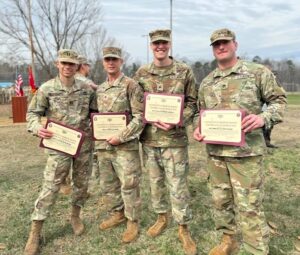
Story by James Black
Walter Reed National Military Medical Center
Expert Field Medical Badge: A Test of Knowledge, Stamina and Resilience
Over 100 service members from across the Defense Health Agency (DHA) competed to earn the U.S. Army’s Expert Field Medical Badge (EFMB) in March after undergoing a series of challenging written exams and grueling physical trainings at Fort Walker, Virginia.
According to the Army, the purpose of the EFMB is to recognize the service members who demonstrate a high degree of professional skills, stamina and proficiency in Tactical Combat Casualty Care.
“I feel a sense of comradery with those that have also earned the badge and feel that the skills obtained will aid me in the opportunity to mentor and motivate future generations of medical professionals within the Army,” shared U.S. Army Staff Sgt. Elisha C. Elmer, one of four Walter Reed service members who recently earned an EFMB.
Elmer says he’ll forever be linked with Walter Reed’s other EFMB winners, including U.S. Army teammates Capt. (Dr.) Nazar Dubchak, medic Staff Sgt. Douglas Pistner, and Sgt. Alexander Gratz.
Fort Walker: A State-of-the-Art Training Facility for the Best of the Best
Fort Walker houses the Asymmetric Warfare Training Center, a $90 million state-of-the-art facility focused on providing joint and combined arms training. The 300-acre facility prepares service members to excel tactically and medically in urban and austere environments.
In order to earn EFMB, candidates must be nominated for consideration by their respective commands, each verifying that the nominees have successfully completed the EFMB digital exam, attained an expert weapons qualification, and have become certified as a basic life saver. According to the U.S. Army Medical Center of Excellence, fewer than 30 percent of the candidates earn the EFMB. “The main inspiration for me participating in the EFMB was the opportunity to test my accumulated knowledge [and] experience a side of Army medicine that my military occupational specialty (MOS) does not often get to participate in,” explained Elmer.
“This is due to typically being placed in military treatment facilities (MTFs) and in-patient settings as opposed to field environments. In order to earn the EFMB, Elmer, Dubchak, Pistner and Gratz completed a written test, a physical fitness assessment, a land navigation course at both day and night, various warrior skills, excel in a series of tactical combat casualty care skills.
Elmer and his teammates endured a 12-mile foot march, and disassembled, reassembled and performed functions check on their M4 carbines, validating themselves as Army medical professionals capable of working in austere field environments. “My goals coincide with the professional meaning of earning an EFMB, which are to continue training, coaching and mentoring the future generations,” confided Elmer, who aspires to be recognized as an exceptional medic capable of providing medical attention in any situation or environment.
Walter Reed’s Band of Brothers
Elmer and his teammates said that training for the weeklong exercise was exhausting, but necessary to build strength and stamina. For medics who work in MTFs, carrying heavy rucks loaded with medical gear, dragging 160-pound Skeds, or patient evacuee sleds, was both physically and mentally taxing.
“At times I was in disbelief [and] it was also demoralizing seeing many of the people that began the events with me being dropped during the running,” recalled Elmer. “To say the least, it was bitter-sweet moment that was also a huge release of anxiety and fear associated with the concern of failure,” confided Elmer, who is proud of his teammates for pushing one another to believe and succeed.